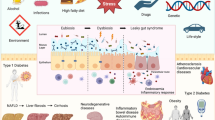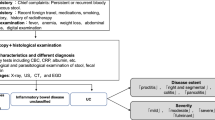Abstract
Background
The ‘hygiene hypothesis’ suggests that a reduction in the microbial exposure due to improved health measures has contributed to an immunological imbalance in the intestine and increased the incidence of autoimmune diseases such as inflammatory bowel diseases (IBD). Accordingly, we investigated associations between oral hygiene practices and IBD.
Methods
We developed and administered a multiple choice questionnaire to evaluate oral hygiene and dental care practices of 137 subjects (83 with IBD and 54 healthy controls).
Results
Of the 83 IBD cases, 31% had ulcerative colitis and 69% had Crohn’s disease. For subjects with IBD, the frequency of brushing at disease onset was significantly higher than in controls (P = 0.005). Also, the frequency of use of dental floss and breath freshener at disease onset was significantly higher in IBD patients (P = 0.005 and <0.001, respectively). Also, patients with IBD more frequently visited their dentist at disease onset (P < 0.001) and continued to visit their dentist more often (P < 0.001). IBD cases had a higher frequency of dental complications such as tooth caries (P = 0.007), oral ulcers (P = 0.04) and dry mouth (P = 0.001).
Conclusions
These findings suggest that oral hygiene practices may cause alterations in the flora of the oral mucosa, which causes imbalance in the gut microbiome (dysbiosis), and thereby contributes to the pathogenesis of IBD. Conversely, the increased frequency of dental problems in IBD patients might be due, at least in part, to alterations in oral flora or to their disease.
Similar content being viewed by others
Abbreviations
- CD:
-
Crohn’s disease
- IBD:
-
Inflammatory bowel disease
- UC:
-
Ulcerative colitis
References
Noverr MC, Huffnagle GB. Does the microbiota regulate immune responses outside the gut? Trends Microbiol. 2004;12(12):562–568.
Elson CO, Cong Y, McCracken VJ, et al. Experimental models of inflammatory bowel disease reveal innate, adaptive, and regulatory mechanisms of host dialogue with the microbiota. Immunol Rev. 2005;206:260–276.
Seksik P, Sokol H, Lepage P, et al. Review article: the role of bacteria in onset and perpetuation of inflammatory bowel disease. Aliment Pharmacol Ther. 2006;24(Suppl 3):11–18.
Tamboli CP, Neut C, Desreumaux P, et al. Dysbiosis in inflammatory bowel disease. Gut. 2004;53(1):1–4.
Rochet V, Rigottier-Gois L, Sutren M, et al. Effects of orally administered Lactobacillus casei DN-114 001 on the composition or activities of the dominant faecal microbiota in healthy humans. Br J Nutr. 2006;95(2):421–429.
Sullivan SN. Hypothesis revisited: toothpaste and the cause of Crohn’s disease. Lancet. 1990;336(8723):1096–1097.
Korzenik JR. Past and current theories of etiology of IBD: toothpaste, worms, and refrigerators. J Clin Gastroenterol. 2005;39(4 Suppl 2):S59–S65.
Oral Health U.S., 2002. The National Institute of Dental and Craniofacial Research of the National Institutes of Health. http://drc.hhs.gov/report/pdfs/OralHealthfigures.pdf. Accessed March 25, 2010.
Maukonen J, Mättö J, Suihko ML, et al. Intra-individual diversity and similarity of salivary and faecal microbiota. J Med Microbiol. 2008;57(Pt 12):1560–1568.
Kalliomäki M, Salminen S, Isolauri E. Positive interactions with the microbiota: probiotics. Adv Exp Med Biol. 2008;635:57–66.
Sokol H, Seksik P, Furet JP, et al. Low counts of Faecalibacterium prausnitzii in colitis microbiota. Inflamm Bowel Dis. 2009;15(8):1183–1189.
Sokol H, Pigneur B, Watterlot L, et al. Faecalibacterium prausnitzii is an anti-inflammatory commensal bacterium identified by gut microbiota analysis of Crohn disease patients. Proc Natl Acad Sci USA. 2008;105(43):16731–16736.
Attin T, Hornecker E. Tooth brushing and oral health: how frequently and when should tooth brushing be performed? Oral Health Prev Dent. 2005;3(3):135–140.
Katz J, Shenkman A, Stavropoulos F, et al. Oral signs and symptoms in relation to disease activity and site of involvement in patients with inflammatory bowel disease. Oral Dis. 2003;9(1):34–40.
Snyder MB, Cawson RA. Oral changes in Crohn’s disease. J Oral Surg. 1976;34(7):594–599.
Harty S, Fleming P, Rowland M, et al. A prospective study of the oral manifestations of Crohn’s disease. Clin Gastroenterol Hepatol. 2005;3(9):886–891.
Grössner-Schreiber B, Fetter T, Hedderich J, et al. Prevalence of dental caries and periodontal disease in patients with inflammatory bowel disease: a case-control study. J Clin Periodontol. 2006;33(7):478–484.
Brito F, de Barros FC, Zaltman C, et al. Prevalence of periodontitis and DMFT index in patients with Crohn’s disease and ulcerative colitis. J Clin Periodontol. 2008;35(6):555–560.
Van Dyke TE, Dowell VR Jr, Offenbacher S, et al. Potential role of microorganisms isolated from periodontal lesions in the pathogenesis of inflammatory bowel disease. Infect Immun. 1986;53(3):671–677.
Tragnone A, Valpiani D, Miglio F, et al. Dietary habits as risk factors for inflammatory bowel disease. Eur J Gastroenterol Hepatol. 1995;7(1):47–51.
Koloski NA, Bret L, Radford-Smith G. Hygiene hypothesis in inflammatory bowel disease: a critical review of the literature. World J Gastroenterol. 2008;14(2):165–173.
Author information
Authors and Affiliations
Corresponding author
Rights and permissions
About this article
Cite this article
Singhal, S., Dian, D., Keshavarzian, A. et al. The Role of Oral Hygiene in Inflammatory Bowel Disease. Dig Dis Sci 56, 170–175 (2011). https://doi.org/10.1007/s10620-010-1263-9
Received:
Accepted:
Published:
Issue Date:
DOI: https://doi.org/10.1007/s10620-010-1263-9




